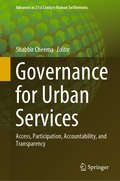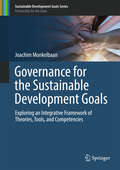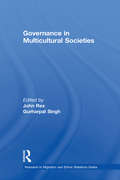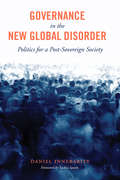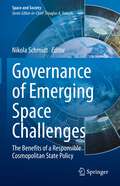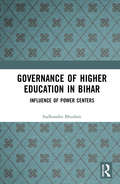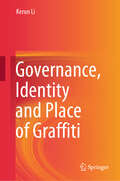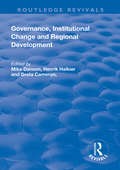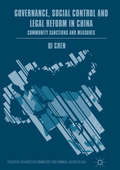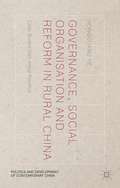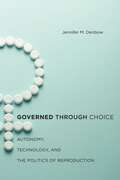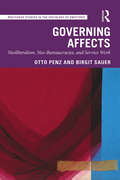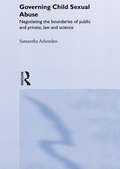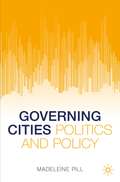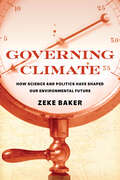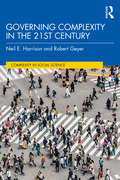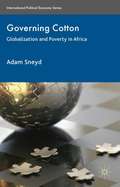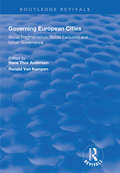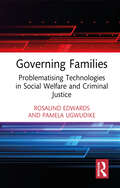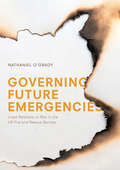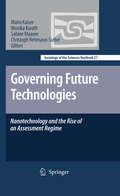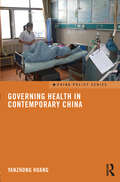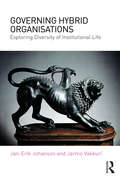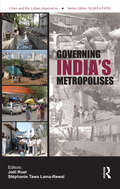- Table View
- List View
Governance for Urban Services: Access, Participation, Accountability, and Transparency (Advances in 21st Century Human Settlements)
by Shabbir CheemaThis book examines three vital issues in urbanization and democratization: the institutional structures and processes of urban local governance to improve access to urban services; their outcomes in relation to low-income groups’ access to services, citizen participation in local governance, accountability of local leaders and officials, and transparency in local governance; and the factors that influence access to urban services, especially for the poor and marginalized groups. Further, it describes decentralization policies, views of the residents of slums on the effectiveness of government programs, and innovations in inclusive local governance and access to urban services.
Governance for the Sustainable Development Goals: Exploring An Integrative Framework Of Theories, Tools, And Competencies (Sustainable Development Goals Series)
by Joachim MonkelbaanThis book provides a detailed overview of governance for the Sustainable Development Goals (SDGs). Adopting a unique integrative approach, it examines the fragmentation of governance that is a critical barrier to achieving the SDGs. The main question addressed is: What are the crucial elements and the organizing logic of an integrative framework that is suitable for analysing governance for the SDGs and for implementing the transitions that we need towards a more sustainable world?This transdisciplinary book first proposes a combination of innovative governance theories that can improve the analysis and practice of sustainability governance. Secondly, it explores the interests of core actors in a number of case examples. And thirdly, it offers recommendations for improving the study and practice of sustainability governance.The findings presented form the basis for a new approach to governance towards objectives such as the SDGs: Integrative Sustainability Governance (ISG). The ensuing ISG framework includes indicator frames within the pillars of power, knowledge and norms. The book concludes that the transformation of crisis into sustainability transitions requires a deeper consideration of risk management that strengthens resilience; systems deliberation that complements democracy; and behavioral insights that elevate human awareness and collaboration. This handbook is a comprehensive and valuable companion for students, experts and practitioners with an interest in the SDGs.
Governance in Multicultural Societies (Research in Migration and Ethnic Relations Series)
by Gurharpal SinghIn the last decade the study of multiculturalism has become an established field in political and social theory. This in-depth and engaging volume focuses on public policy and the dilemmas faced by the governments of increasingly diverse societies. Offering a theoretically and empirically rich collection of essays from some of the leading specialists in the field, it fills the gap between the social and political theory of multiculturalism and institutionally based national case studies. The book is distinctive in combining a robust theoretical introduction to recent developments in multiculturalism with a critical evaluation of contemporary public policy in a variety of countries in Europe, South Asia, Southeast Asia, the Far East and South Africa. It incorporates a strong comparative dimension both within and across the case studies, with a regional focus enabling comparisons of regional, national and international experience.
Governance in the New Global Disorder: Politics for a Post-Sovereign Society
by Daniel InnerarityWhen we talk about globalization, we tend to focus on its social and economic benefits. In Governance in the New Global Disorder, the political philosopher Daniel Innerarity considers its unsettling and largely unacknowledged consequences. The "opening" of different societies to new ideas, products, and forms of prosperity has introduced a persistent uncertainty, or disorder, into everyday life. Multinational corporations have weakened sovereignty. We no longer know who is in control or who is responsible. Economies can collapse without sufficient warning, and the effort to rebuild can drag on for years. Piracy is everywhere. Is there any way to balance the interests of state, marketplace, and society in this new construct of power? Since national economies have become deterritorialized and political interdependencies aggravate our common vulnerabilities, Innerarity contends that there is no other solution except to move toward global governance and a denationalization of justice. Globalization tries to unify the world through technologies, the economy, and cultural products and styles, but it cannot articulate or regulate political and legal equivalents. Everyone faces the same risks to their security, food supply, health, financial stability, and environment, and these risks demand a new global politics of humanity. In her foreword, the sociologist Saskia Sassen isolates the key takeaways from Innerarity's argument and the solutions they present to growing global tensions.
Governance of Emerging Space Challenges: The Benefits of a Responsible Cosmopolitan State Policy (Space and Society)
by Nikola SchmidtThis edited volume discusses how even small nation states can make a significant difference in the future of space governance. The book is divided into three main sections covering political theory, case studies, and space technology and applications. Key topics of discussion include planetary defense, space mining, and high-power systems in space. Through these timely subjects, the book presents strategies for developing a truly global governance framework in space, based on the concept of a responsible cosmopolitan state. Authored by a multidisciplinary group of researchers from the Czech Republic, the volume will appeal to other scientific teams and policymakers looking to become pioneers of cosmopolitan space policies at a national and global level.
Governance of Higher Education in Bihar: Influence of Power Centers
by Sudhanshu BhushanThis book presents the state-specific dimensions of the governance of higher education in Bihar, India, based on a real-case perspective. It discusses the policies of the center and state governments, and their implications on the state's higher education system. It addresses the issues and challenges faced by the higher education sector from the point of view of multiple stakeholders at center, state, university and college levels, while examining influential power centers. The volume focuses on select universities in the state and looks at how they manage policies, schemes and regulations. It deals with key themes such as the role of state and regulatory bodies such as the University Grants Commission; the balance of power; resource scarcity; the inadequacy of top-down governance models; governance failure; and the autonomy of universities. It explores the conflict between the politics and economics of governance and efficiency; the promotion and recruitment of senior office-bearers and teachers; the privatization of colleges; and financing, admission and examination systems. Through an in-depth study using empirical unit-level data from the All-India Survey of Higher Education, examples and theoretical frameworks, the book analyzes the reasons for the underperformance of the governance system of higher education in Bihar. It also offers suggestions and policy recommendations to help improve its planning and management via participative and responsible governance and informed institutional leadership. This book will be of interest to students, teachers and researchers of education, higher education, economics, governance and public administration, and development studies. It will also be useful to educationists and experts, education administrators, policymakers, bureaucrats and the governing bodies of higher education institutions.
Governance, Identity and Place of Graffiti
by Kerun LiThis book offers a comprehensive overview of graffiti culture in China, particularly through the example of graffiti in the Furong Tunnel at Xiamen University. It explores the complex relationship between graffiti as an art form and social behavior, focusing on its definition, legality, public space conflicts, sense of place, and interactions under management systems. Firstly, the book discusses the varying definitions of graffiti in Western and Chinese contexts. Using the Furong Tunnel graffiti as a case study, it examines the line between artistic expression and vandalism, highlighting issues of legality, sense of place, and publicness. Secondly, it delves into the practice of graffiti in public spaces, particularly within Xiamen University. The graffiti in the Furong Tunnel has sparked debates about the conflict between educational and social functions, altering the tunnel's spatial form and function. It has become a focal point for conflicts between tourists and students, reflecting the complexity of campus space. The book also explores how graffiti constructs a sense of place and its associated social conflicts. By tracing the historical development of tunnel graffiti, it shows how graffiti becomes a collective memory and cultural symbol, serving as a medium for students to express emotions and construct local identities. Furthermore, the book addresses the legality of graffiti and the negotiation among actors under management systems. Although not legally considered a tourism resource, the university's stance is ambiguous, balancing strict regulations with using graffiti for publicity. Specific incidents of vandalism highlight conflicts between graffiti culture and campus management, discussing issues of protection and restoration. Lastly, the book examines ownership and management of graffiti. Conflicts over preservation and usage rights between students and tourists show the university's role as a coordinator. It emphasizes graffiti's importance in campus culture and as a promotional tool, while also noting that management measures might limit free expression, leading to homogenization concerns. Using multiple research methods, this book explores the social and political implications of graffiti, emphasizing the interactions and conflicts among stakeholders. It reveals the significance of graffiti in Chinese society and offers solutions to issues concerning graffiti culture in contemporary China.
Governance, Institutional Change and Regional Development (Routledge Revivals)
by Henrik Halkier Mike Danson Greta CameronThis title was first published in 2000: This volume addresses the prominent role given to institution-building, institutional change and governance in the regional development strategies and policies. The establishment of the Scottish Parliament, Welsh and Northern Ireland Assemblies, and the arrival of regional development agencies in England highlighted the need to put the initiatives into some context, drawing on experience from across Europe on the critical factors in the determination of the potential and success of regions. Central to the discussions presented here by a group of European experts are the question of governance - how does an ongoing process of institution-building affect the ways in which regions and localities are governed, including questions of democracy, participation, regional self-determination, public-private partnerships, networks and accountability; and the consequences of new modes of governance and institutional change for regional development strategies and policies, particularly in the context of large-scale industrial restructuring and city-region and urban regeneration.
Governance, Social Control and Legal Reform in China: Community Sanctions And Measures (Palgrave Advances in Criminology and Criminal Justice in Asia)
by Qi ChenThis book outlines how community sentences and early release options are administered in China. Chen provides empirical insights into the emerging community sector of the Chinese penal system, and illustrates how Chinese criminal courts decide between imprisonment and community sentences. Drawing on interviews with government and non-governmental supervisors, this methodological and rigorous study offers an in-depth discussion of the enforcement of these community sanctions and measures (CSM). By using the CSM reform as an example, this book illustrates the adaptation of Chinese governance and social control. Ultimately, Chen argues that the current model of governance in China (disciplinary governance) cannot guarantee an effective state-agent relationship; it also denies local governments sufficient legitimacy to secure social stability. Finally, proposing that only the rule of law and an active judiciary can complement these two deficiencies, this book will be of great interest to scholars of criminology, law, and penology, as well as anyone who is interested in how China is held together in a socio-legal sense.
Governance, Social Organisation and Reform in Rural China
by Hongguang HeXiaogang village, located in Anhui Province, was reputedly the first village in China to decollectivise in 1978, paving the way for agricultural reform and a new rural economy in China. This study explores how farmers in Xiaogang have engaged in various forms of cooperation in the decades since decollectivisation and the extent to which changing political and social contexts of the rural China are likely to impact upon the way in which farmers cooperate and collaborate with each other. In an attempt to understand the relationship between farmers and the state in a rapidly changing China, the text focuses upon governance and social organisation within the village and explores the extent to which farmers have autonomy in both their economic and political activities. While decollectivisation is often interpreted as the second 'liberation' of Chinese farmers, it is clear that new power structures have emerged to replace those of the collective and the commune. While many studies have explored this question in terms of a so-called binary opposition between the state and the community, they have tended to neglect the subtleties behind this opposition. Utilising Foucault's concept of 'governmentality', this study develops new ways of understanding micro-level power relations that enable and constrain certain forms of political and economic activity within the village.
Governed through Choice: Autonomy, Technology, and the Politics of Reproduction
by Jennifer M. DenbowA trailblazing look at how the law regulates women’s bodies as reproductive sites and what can be done about it.At the center of the “war on women” lies the fact that women in the contemporary United States are facing more widespread and increased surveillance of their reproductive health and decisions. In recent years states have passed a record number of laws restricting abortion. Physicians continue to sterilize some women against their will, especially those in prison, while other women who choose to forego reproduction cannot find physicians to sterilize them. While these actions seem to undermine women’s decision-making authority, experts and state actors often defend them in terms of promoting women’s autonomy.In Governed through Choice, Jennifer M. Denbow exposes the way that the notion of autonomy allows for this apparent contradiction and explores how it plays out in recent reproductive law, including newly enacted informed consent to abortion laws like ultrasound mandates and the regulation of sterilization. Denbow also shows how developments in reproductive technology, which would seem to increase women’s options and autonomy, provide even more opportunities for state management of women’s bodies. The book argues that notions of autonomy and choice, as well as transformations in reproductive technology, converge to enable the state’s surveillance of women and undermine their decision-making authority. Yet, Denbow asserts that there is a way forward and offers an alternative understanding of autonomy that focuses on critique and social transformation. Moreover, while reproductive technologies may heighten surveillance, they can also help disrupt oppressive norms about reproduction and gender, and create space for transformation. A critically important analysis, Governed through Choice is a trailblazing look at how the law regulates women’s bodies as reproductive sites and what can be done about it.
Governing Affects: Neoliberalism, Neo-Bureaucracies, and Service Work (Routledge Studies in the Sociology of Emotions)
by Birgit Sauer Otto PenzGoverning Affects explores the neoliberal transformation of state governance in Europe towards affective forms of dominance exercised by customer-oriented neo-bureaucracies and public service providers. By investigating the rise of affective labour in contemporary European service societies and the conversion of state administrations into business-like public services, the authors trace the transformative power of neoliberal political thought as it is put into practice. The book examines new affective modes of subjectivation and activation of public employees, as well as their embodiment of affective requirements, to successfully guide and advise citizens. Neoliberalism induces a double agency in neo-bureaucrats: entrepreneurialism is coupled with affective skills for the purpose of governing clients in their own best interests. These competences are unevenly distributed between the genders, as their affective dispositions differ historically. Drawing on the theoretical concepts of Foucault and Bourdieu, the book offers innovative insights into recent processes of state transformation, affective subjectivation, and changes in labour relations. By combining theory building on governance with empirical research in key areas of state power, the book will be of interest to scholars and researchers in a broad range of disciplines, including political science, political sociology, and critical governance studies.
Governing Child Sexual Abuse: Negotiating the Boundaries of Public and Private, Law and Science
by Samantha AshendenThe turn of the 1990s saw a number of high profile public inquiries into the handling of child sexual abuse cases in Great Britain. In examines the implications of these inquiries on the regulation of relationships between families and the state, author Samantha Ashenden brings a number of contemporary debates in social and political theory to bear upon the governance of child sexual abuse. In particular, drawing on the work of Foucault and Habermas, Ashenden looks at:* how to analyze the boundary between public and private spheres* the legal and scientific determination of legitimate intervention* the relationship between democracy and expertise in the governance of social life.Timely and topical, this book will be of particular interest to scholars and students of social and political theory, political sociology, the sociology of law, and social policy.
Governing Cities: Politics and Policy
by Madeleine PillIn our urban world, cities are where most of us experience how our economies and societies are organised and the inequalities which result. This textbook introduces ideas, theories, concepts and examples to help us understand the political and policy challenges of governing cities, centred on the principal challenge of how to make our cities more equitable. It poses critical questions – about how cities are governed, by whom, according to what values, and for whom – and draws from a wide range of urban scholarship. The ‘how’ covers urban politics and the policy instruments which result. The ‘by whom’ addresses power relations within and beyond the city and the tensions between different priorities and values. The ‘for whom’ centres equity and the role of citizens and collective action in how we are governed. In addressing these questions, the book provides an overview of the core theories of urban politics and governance, thinks about what happens at different scales, and examines new forms of citizen activism which herald alternatives for cities. It is a unique introduction to students, policymakers and practitioners who want to understand and seek to improve urban politics and policy.
Governing Climate: How Science and Politics Have Shaped Our Environmental Future
by Zeke BakerAfter decades of debate about global warming, the fact of the climate crisis is finally widely accepted. People at all scales—from the household to the global market—are attempting to govern climate to deal with its causes and impacts. Although the stakes are different now, governing climate is centuries old. In this book, Zeke Baker develops a genealogy of climate science that traces the relationship between those who have created knowledge of the climate and those who have attempted to gain power and govern society, right up to the present, historic moment. Baker draws together over two centuries of science, politics, and environmental change to demonstrate the "co-production" of climate knowledge and power-seeking activity, with a focus on the United States. This book provides a fresh account of contemporary issues transecting science and climate politics, specifically the rise of "climate security," and examines how climate science can either facilitate or reconcile the unequal distribution of power and resources.
Governing Complexity in the 21st Century (Complexity in Social Science)
by Neil E. Harrison Robert GeyerGoverning Complexity in the 21st Century surveys the ways in which social systems are becoming more complex. It shows how this complexity impacts every aspect of life for individuals, governments and societies in most social systems at individual, regional, national and global scales and explores how embracing ‘complexity thinking’ can greatly improve the art of governance in all policy areas. The book clearly explains the ideas and methods of complexity science—widely accepted in both the natural and social sciences—then demonstrates how ‘complexity thinking’ can be applied to improve our understanding of governance and policy actions. Providing a deep analysis of many governance challenges, including economic development and technological innovation, environment management, climate change and development in the Middle East, the book also compares national responses to the COVID-19 pandemic. Clear and jargon-free, this book is accessible to undergraduates and scholars alike. It is essential reading for policymakers everywhere, showcasing methods for governing effectively and efficiently in our increasingly complex world. It brings together the broad range of social and environmental science fields and will be useful for those studying or working in policy, politics and international relations, environmental issues, business management, philosophy, history and sociology.
Governing Cotton
by Adam SneydThis book traces the historic relationships between cotton production, the international cotton trade and poverty south of the Sahara, and assesses various approaches to corporate social responsibility and nongovernmental policy advocacy in this area.
Governing European Cities: Social Fragmentation, Social Exclusion and Urban (Routledge Revivals)
by Hans Thor AndersenThis title was first published in 2001. This volume is a result of the action COST A9 "Civitas - Transformation of European Cities and Urban Governance", launched in 1995, which looks at the emergence of the urban question. The COST framework is a European mechanism to provide scientific and technical assistance for national research programmes. The text covers the change in the importance of European cities and analyzes how each city re-formulates its policies and methods of governing in response to these changes. This text is to analyze the new forms of urban governance using three points of view, a statistical approach, an economic approach and a sociological approach. This book tackles the fragmentation and social exclusion that occurs in urban society and explores the different forms it takes throughout Europe. It also presents some strategies to combat or at least regulate this fragmentation, to ensure a united European city.
Governing Families: Problematising Technologies in Social Welfare and Criminal Justice (Routledge Advances in Sociology)
by Rosalind Edwards Pamela UgwudikeThis book provides a focused discussion of how families are governed through technologies. It shows how states attempt to influence, shape and govern families as both the source of and solution to a range of social problems including crime. The book critically reviews family governance in contemporary neo-liberal society, notably through technologies of self-responsibilisation, biologisation, and artificial intelligence. The book draws attention to the poor working class and racialised families that often are marked out and evaluated as culpable, dysfunctional, and a threat to economic and social order, obscuring the structural inequalities that underpin family lives and discriminations that are built into the tools that identify and govern families. Filling a gap where disciplinary perspectives cross-cut, this book brings together sociological and criminological perspectives to provide a unique cross-disciplinary approach to the topic. It will be of interest to researchers, scholars and lecturers studying sociology and criminology, as well as policy-makers and professionals working in the fields of early years and family intervention programmes, including in social work, health, education, and the criminologically-relevant professions such as police and probation.
Governing Future Emergencies: Lived Relations to Risk in the UK Fire and Rescue Service
by Nathaniel O'GradyThe 21st century has born witness to myriad changes in the way the world is secured from the many emergencies that continually threaten to disrupt it. This book concentrates on two such changes. First, it takes stock of the ever-increasing development and diversification of data and digital technologies that security organisations have at their disposal. Secondly, it examines how these digital devices have fostered a new direction in which security agencies primarily conceive of emergencies as so many risks of the future. Emergency governance has undergone what might be called an anticipatory turn here, with digitally rendered and imagined scenes of future contingency becoming cause and justification for intervention in the here and now. Rather than scrutinising this turn at its most spectacular heights in the domains, for instance, of warfare or counter-terrorism, the book explores the facilitation of risk governance through digital technologies in a more quotidian incarnation; namely by tracing the steps that the United Kingdom’s Fire and Rescue Service (FRS) take to govern fire emergencies whose potential has been identified but have yet to unfold. Delving into the FRS, the book maps out a digital infrastructure that includes various software, institutional processes, multiple forms of risk calculation but also human beings, relations and consciousness and an array of material spaces in which these things exist. Accentuated here is how these components assemble to produce projections of future emergencies on a number of sensorial registers. This infrastructure is shown, in turn, to inform and shape a catalogue of refined modes of action through which interventions on future emergencies are made in the present. Engaging in depth with this infrastructure, the FRS provides an understanding of risk as a lived relation, risk as an organisational ethos whose liveliness is founded upon and reverberates through the relations existing between those people and things operating in the FRS to make sense of potential fire emergencies. Using the concept of lived relation as a foundation, the book develops a critical understanding of anticipatory governance by grasping its resonance with issues emanating in the wider field of security, showing how security figures as a set of practices that rely upon and cultivates affective conditions, that enrols the force of elements like fire into its institutional arrangement, that draw on an array of knowledges to exercise power and, in the process, that instantiate new forms of subjectivity.
Governing Future Technologies
by Christoph Rehmann-Sutter Sabine Maasen Mario Kaiser Monika KurathNanotechnology has been the subject of extensive 'assessment hype,' unlike any previous field of research and development. A multiplicity of stakeholders have started to analyze the implications of nanotechnology: Technology assessment institutions around the world, non-governmental organizations, think tanks, re-insurance companies, and academics from science and technology studies and applied ethics have turned their attention to this growing field's implications. In the course of these assessment efforts, a social phenomenon has emerged - a phenomenon the editors define as assessment regime. Despite the variety of organizations, methods, and actors involved in the evaluation and regulation of emerging nanotechnologies, the assessment activities comply with an overarching scientific and political imperative: Innovations are only welcome if they are assessed against the criteria of safety, sustainability, desirability, and acceptability. So far, such deliberations and reflections have played only a subordinate role. This book argues that with the rise of the nanotechnology assessment regime, however, things have changed dramatically: Situated at the crossroads of democratizing science and technology, good governance, and the quest for sustainable innovations, the assessment regime has become constitutive for technological development. The contributions in this book explore and critically analyse nanotechnology's assessment regime: To what extent is it constitutive for technology in general, for nanotechnology in particular? What social conditions render the regime a phenomenon sui generis? And what are its implications for science and society?
Governing Health in Contemporary China (China Policy Series)
by Yanzhong HuangThe lack of significant improvement in people’s health status and other mounting health challenges in China raise a puzzling question about the country’s internal transition: why did the reform-induced dynamics produce an economic miracle, but fail to reproduce the success Mao had achieved in the health sector? This book examines the political and policy dynamics of health governance in post-Mao China. It explores the political-institutional roots of the public health and health care challenges and the evolution of the leaders’ policy response in contemporary China. It argues that reform-induced institutional dynamics, when interacting with Maoist health policy structure in an authoritarian setting, have not only contributed to the rising health challenges in contemporary China, but also shaped the patterns and outcomes of China’s health system transition. The study of China’s health governance will further our understanding of the evolving political system in China and the complexities of China’s rise. As the world economy and international security are increasingly vulnerable to major disease outbreaks in China, it also sheds critical light on China’s role in global health governance.
Governing Human Lives and Health in Pandemic Times: Social Control Policies (Routledge Advances in Sociology)
by Matilda HellmanGoverning Human Lives and Health in Pandemic Times looks into the instruments and the type of reasoning involved when large-scale social control strategies were implemented worldwide in response to the COVID-19 pandemic. The repertoires of institutional and administrative governance tools used during the pandemic are studied in their unique institutional, socio-geographic and cultural settings, in order to form an understanding of the political climates and the values inscribed in current societal contracts. The book is intended for academic audiences interested in policy research, health governance, and civil societal issues. It will be of great relevance and use for a wide audience of policy-makers, public officials and health care planners as well as students in a broad range of disciplines.
Governing Hybrid Organisations: Exploring Diversity of Institutional Life
by Jan-Erik Johanson Jarmo VakkuriIntuitively, organisations can easily be categorised as ‘public’ or ‘private’. However, this book questions such a black and white dichotomy between public and private, and seeks a deeper understanding of hybrid organisations. These organisations can be found at micro, meso and macro levels of societal activity, consisting of networks between companies, public agencies and other entities. The line between these two realms is increasingly blurred — giving rise to hybrid organisations. Governing Hybrid Organisations presents an engaging discussion around hybrid organisations, highlighting them as important and fascinating examples of modern institutional diversity. Chapters examine the changing landscape of service delivery and the nature and governance of hybrid organisations, using international examples and cases from different service contexts. The authors put forward a clear analytical framework for understanding hybrid governance, looking at strategy and performance management. This text will be valuable for students of public management, public administration, business management and organisational studies, and will also be illuminating for practising managers.
Governing India's Metropolises: Case Studies of Four Cities (Cities and the Urban Imperative)
by Stéphanie Tawa Lama-Rewal Joël RuetThis book is a comparative, sector-based study of the changing character of governance in Indian metropolises in the 2000s. Highlighting the horizontal and vertical ties of the participatory groups, both state and non-state, it looks at key civic issues.
